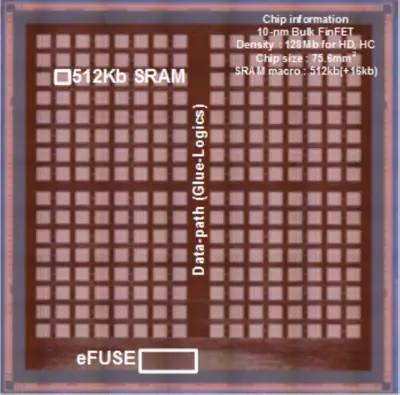The 10 nanometer (10 nm) lithography process is a full node semiconductor manufacturing process following the 14 nm process stopgap. The term "10 nm" is simply a commercial name for a generation of a certain size and its technology, as opposed to gate length or half pitch. Commercial mass production of integrated circuit manufacturing using 10 nm process begun with risk production in late 2016 and ramped up in mid-to-late 2017. This technology is set to be replaced by 7 nm process 2019.
Contents
Industry
Announced during Intel's Technology and Manufacturing Day 2017, Intel's 10 nm process (P1274) is the first high-volume manufacturing process to employ Self-Aligned Quad Patterning (SAQP) with production starting in the second half of 2017. Samsung, which unlike Intel uses LELELE (litho-etch-litho-etch-litho-etch), plans ramp up mass production in May of 2017.
Due to marketing names the transistor sizes vary considerably between leading manufactures. For example, Intel's 10nm process is denser and smaller than TSMC's 7 nm process while Samsung's 10 nm process is more similar to Intel's 14 nm process.
| Process Name | |
|---|---|
| 1st Production | |
| Litho- graphy |
Lithography |
| Immersion | |
| Exposure | |
| Wafer | Type |
| Size | |
| Tran- sistor |
Type |
| Voltage | |
| Fin | Pitch |
| Width | |
| Height | |
| Gate Length (Lg) | |
| Contacted Gate Pitch (CPP) | |
| Minimum Metal Pitch (MMP) | |
| SRAM bitcell |
High-Perf (HP) |
| High-Density (HD) | |
| Low-Voltage (LV) | |
| DRAM bitcell |
eDRAM |
| Intel | TSMC | Common Platform Alliance The Common Platform Alliance is a joint collaboration between IBM, Samsung, GlobalFoundries, STMicroelectronics, UMC |
Samsung | ||||
|---|---|---|---|---|---|---|---|
| P1274 (CPU) / P1275 (SoC) | 10LPE 1st generation; 10 nm Low Power Early , 10LPP2nd generation; 10 nm Low Power Performance , 10LPU3rd generation; 10 nm Low Power Ultimate
| ||||||
| 2017 | 2017 | 2017 | |||||
| 193 nm | 193 nm | 193 nm | 193 nm | ||||
| Yes | Yes | Yes | Yes | ||||
| SAQP | SADP | LELELE | |||||
| Bulk | Bulk | Bulk/SOI | Bulk | ||||
| 300 mm | 300 mm | 300 mm | 300 mm | ||||
| FinFET | FinFET | FinFET | FinFET | ||||
| Value | 14 nm Δ | Value | 16 nm Δ | Value | 14 nm Δ | Value | 14 nm Δ |
| 34 nm | 0.81x | ||||||
| 53 nm | 1.26x | ||||||
| 20 nm | |||||||
| 54 nm | 0.77x | 64 nm | 0.71x | 64 nm | 0.80x | 64 nm | 0.82x |
| 36 nm | 0.69x | 42 nm | 0.66x | 48 nm | 0.75x | 48 nm | 0.75x |
| 0.0441 µm² | 0.62x | 0.049 µm² | 0.61x | ||||
| 0.0367 µm² | 0.73x | 0.042 µm² | 0.57x | 0.053 µm² | 0.65x | 0.040 µm² | 0.63x |
| 0.0312 µm² | 0.53x | ||||||
Samsung
Samsung demonstrated their 128 Mebibit SRAM wafer from their 10nm FinFET process.
| Samsung 128 Mib SRAM demo 10 nm wafer | |||||||||||||||
|---|---|---|---|---|---|---|---|---|---|---|---|---|---|---|---|
|

| ||||||||||||||
10 nm Microprocessors
- MediaTek
- Qualcomm
- Xiaomi
This list is incomplete; you can help by expanding it.
10 nm Microarchitectures
- Intel
- Qualcomm
This list is incomplete; you can help by expanding it.
Documents
- Intel's 10 nm Technology: Delivering the Highest Logic Transistor Density in the Industry Through the Use of Hyper Scaling
- Intel Technoogy & Manufacturing Day presentation, 10 nm
- Intel Technoogy & Manufacturing Day presentation, 10 nm / Moore's Law
References
- Mark Bohr, Intel. Intel Technology and Manufacturing Day. Mar 28, 2017.
- Samsung uses LELELE based on their press release about their 10nm FinFET Technology on October 17, 2016.
- Seo, K-I., et al. "A 10nm platform technology for low power and high performance application featuring FINFET devices with multi workfunction gate stack on bulk and SOI." VLSI Technology (VLSI-Technology): Digest of Technical Papers, 2014 Symposium on. IEEE, 2014.
- Cho, H-J., et al. "Si FinFET based 10nm technology with multi Vt gate stack for low power and high performance applications." VLSI Technology, 2016 IEEE Symposium on. IEEE, 2016.
- Song, Taejoong, et al. "A 10 nm FinFET 128 Mb SRAM With Assist Adjustment System for Power, Performance, and Area Optimization." IEEE Journal of Solid-State Circuits (2016).
- Clinton, Michael, et al. "12.3 A low-power and high-performance 10nm SRAM architecture for mobile applications." Solid-State Circuits Conference (ISSCC), 2017 IEEE International. IEEE, 2017.
 Semiconductor lithography processes technology
Semiconductor lithography processes technology